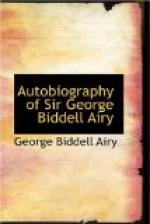“About Ladyday 1817 I began to read mathematics with Mr Rogers (formerly, I think, a Fellow of Sidney College, and an indifferent mathematician of the Cambridge school), who had succeeded a Mr Tweed as assistant to Mr Crosse in the school. I went to his house twice a week, on holiday afternoons. I do not remember how long I received lessons from him, but I think to June, 1818. This course was extremely valuable to me, not on account of Mr Rogers’s abilities (for I understood many things better than he did) but for its training me both in Cambridge subjects and in the Cambridge accurate methods of treating them. I went through Euclid (as far as usually read), Wood’s Algebra, Wood’s Mechanics, Vince’s Hydrostatics, Wood’s Optics, Trigonometry (in a geometrical treatise and also in Woodhouse’s algebraical form), Fluxions to a good extent, Newton’s Principia to the end of the 9th section. This was a large quantity, but I read it accurately and understood it perfectly, and could write out any one of the propositions which I had read in the most exact form. My connexion with Mr Rogers was terminated by his giving me notice that he could not undertake to receive me any longer: in fact I was too much for him. I generally read these books in a garret in our house in George Lane, which was indefinitely appropriated to my brother and myself. I find that I copied out Vince’s Conic Sections in February, 1819. The first book that I copied was the small geometrical treatise on Trigonometry, in May, 1817: to this I was urged by old Mr Ransome, upon my complaining that I could not purchase the book: and it was no bad lesson of independence to me.”
During the same period 1817-1819 he was occupied at school on translations into blank verse from the Aeneid and Iliad, and read through the whole of Sophocles very carefully.
The classical knowledge which he thus gained at school and subsequently at Cambridge was sound, and he took great pleasure in it: throughout his life he made a practice of keeping one or other of the Classical Authors at hand for occasional relaxation. He terminated his schooling in June 1819. Shortly afterwards his father left Colchester and went to reside at Bury St Edmund’s. The Autobiography proceeds as follows:
“Mr Clarkson was at one time inclined to recommend me to go to St Peter’s College (which had been much enriched by a bequest from a Mr Gisborne). But on giving some account of me to his friend Mr James D. Hustler, tutor of Trinity College, Mr Hustler urged upon him that I was exactly the proper sort of person to go to Trinity College. And thus it was settled (mainly by Mr Clarkson) that I should be entered at Trinity College. I think that I was sent for purposely from Colchester to Playford, and on March 6th, 1819, I rode in company with Mr Clarkson from Playford to Sproughton near Ipswich to be examined by the Rev. Mr Rogers, incumbent of Sproughton, an old M.A. of Trinity College; and was examined, and my certificate duly sent to Mr Hustler; and I was entered on Mr Hustler’s side as Sizar of Trinity College.




